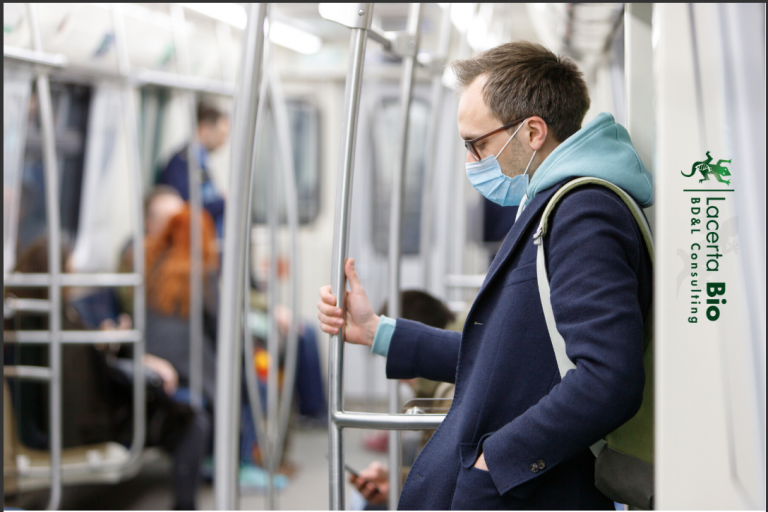
It is an interesting question. With so much information and mis-information coming at us, it is difficult to tackle this issue in a meaningful and insightful way. For those of you who are statistically inclined, World-O-Meter has continuous updates on active and recovered cases. Johns Hopkins has created a real-time dashboard. And so on.
To bring yourself up to speed on events since December, the Wikipedia page is roughly chronological and extraordinarily detailed (caveat emptor).
Our industry is responding quickly. Nearly 30 clinical readouts are expected by April. This is great news, especially as the projections for morbidity and mortality in the US look grim (PDF).
From our industry’s perspective, we see a few issues and trends quickly emerging:
Virtual Partnering going Viral?
The upcoming BIO-Europe partnering conference in Paris will be 100% virtual. Attendees will log in and “meet” their counterparts via video. Attendees will have the opportunity to record and upload “pitch” presentations. It is a sensible idea under the circumstances…bold, even. But we will be very interested to see to what degree attendance and participation is affected.
The broader question is whether this model will take hold in the coming months and years. Most conference companies will not have the ability to quickly shift from live to digital unless the infrastructure and expertise is already in place in anticipation of a major disruption like this. Other industries are cancelling events and modifying behaviors, with some facing unique challenges thanks to coronavirus.
Looking ahead, which other conferences will be impacted? From our perspective, we are carrying on with our BIO plans. For now, coronavirus cases in California are on the rise. We will simply need to see how this plays out in the weeks to come. In the near-term, major conferences in March and April such as HIMSS will be cancelled. Other conferences, like BioTrinity 2020 in London, are pressing ahead (as of this writing).
We would love to get your opinion on virtual conferences. So we have developed a survey on Virtual Conferences. It should only take you 5 minutes or less. And we will draw one name from the completed entries to receive a $50 gift card to Amazon.
Will Dealmaking slow down?
We have little doubt that some transactions will be delayed due to travel bans. Yes, we have online data rooms, video conferencing, etc., etc. But nothing replaces face to face negotiation, even when the entire asset under consideration is on paper. If facilities are part of a deal, no amount of live streaming will keep that process on track.
The resulting backlog of due diligence work, coupled with stay-at-home work policies, will make for some interesting organization dynamics in the moths ahead. Will some employees realize that working from home is more efficient and preferable? Will companies relax stay-at-home policies in exchange for reduced risk of employee illness? And for how long?
Will temporary workers & consultants be brought in to help process the diligence backlog?
Innovation to the Rescue
Our industry is an easy target for politicians and pundits alike. But when they need us to innovate…crickets…
To be fair, the US government is moving very quickly with financial support for R&D, support for state and local agencies, and the like. Some will say this is too little and too late. But in our system, it is an unfortunate reality that local and State governments can act far more swiftly (and arguably, effectively) than our national government.
Indeed, this was demonstrated during the 1918 influenza outbreak, where different cities reacted differently, and had very different outcomes.
BIO has a page summarizing some of the activities already underway, from RNAi therapeutics to vaccines. Even HIV anti-virals are being repurposed and are already in Phase III clinical trials, with some results expected by April.
Of course some of these innovations will be expensive. Insurance coverage may be problematic for some patients. It is to be expected. Ideally, we will see a commercialized vaccine which will be recommended for a) travelers and b) those at highest risk.
Let’s keep in mind that thousands of people still die from influenza, even with the presence of freely-available (and cheap) vaccines.
Supply Chain Disruptions?
As it turns out, the Hubei province in Central China has a very large concentration of pharmaceutical manufacturers. The majority of these facilities manufacture API, with a few others focused on commercial doses, API biologics, and injectables.
Some of these facilities are owned by companies in the US and Europe. According to this report, shortages should not be an issue unless coronavirus causes major disruptions on the Eastern seaboard of China, preventing products from Hubei to be exported.
Interestingly, India is restricting the export of certain APIs, such as acyclovir and clindamycin, to ensure their citizens have sufficient supply.
Now what?
There is little for us to recommend that has not been said already:
- Practice good hygeine (hand washing, etc.)
- Be patient with colleagues who are not accustomed to working from home
- Monitor rational sources of news coverage and information being released by your employers, plus state and local officials
- Respectfully offer or accept alternatives to handshakes, like this:
Media error: Format(s) not supported or source(s) not found
Download File: https://lacertabio.com/wp-content/uploads/2020/03/Coronavirus-Greeting.mp4?_=1Ultimately, we humans are social beings. Yes, we have to adapt to environmental events that are largely out of our control. But we simply cannot allow a virus, no matter how serious it is, from preventing us to behave as normally and as respectfully as possible.
Carry on.
P.S. Hat Tip to Jim Johnson for sharing this video with us.

